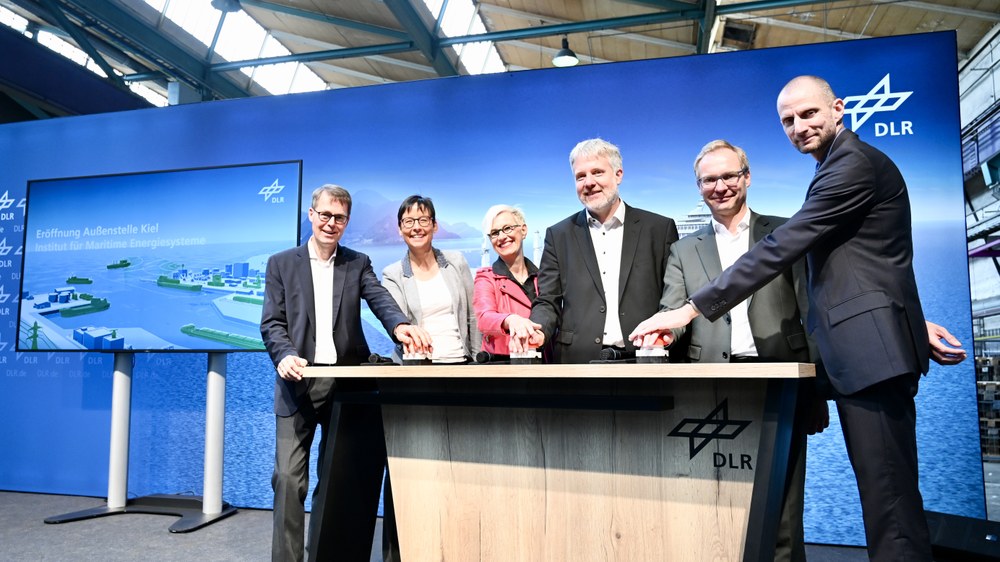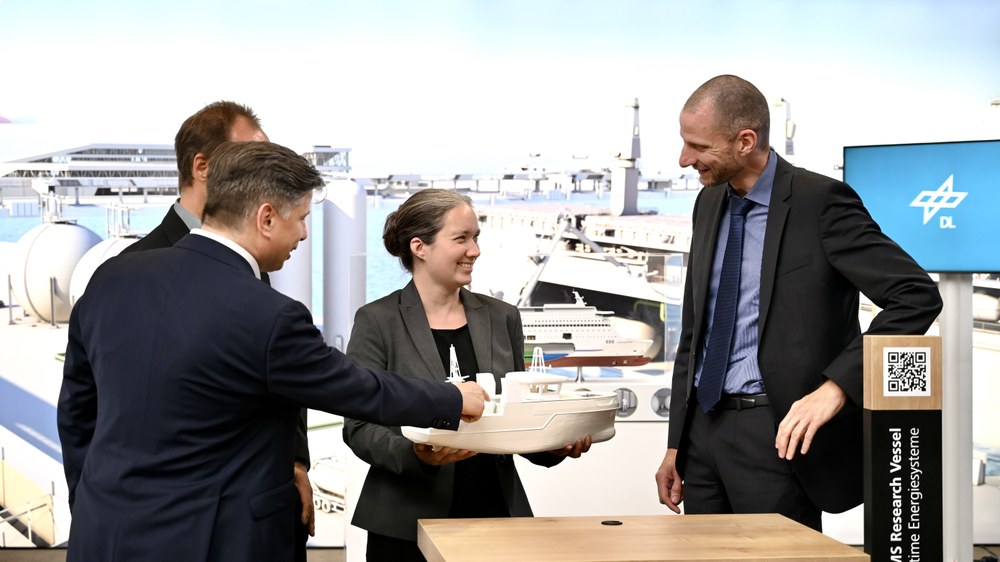DLR research on climate-compatible shipping comes to Kiel



- On 21 June 2024, DLR opened a new site in Kiel for the Institute of Maritime Energy Systems.
- Scientists are researching emission-free shipping operations, taking into account the entire energy conversion chain.
- The construction of a research vessel is currently under tender to test alternative propulsion systems and components.
- A 'digital twin' will be used to supplement testing by simulating extreme conditions.
- Focus: Energy, transport, digitalisation
The maritime sector is responsible for around 80 percent of all international freight transport and generates some 1.1 billion tonnes of carbon dioxide every year. This is set to change: the Institute of Maritime Energy Systems at the German Aerospace Center (Deutsches Zentrum für Luft- und Raumfahrt; DLR) develops, optimises and integrates systems for emission-free ship operations. This includes transport concepts for alternative fuels, along with the associated requirements for harbour infrastructure and the development of emission-free ships. On 21 June 2024, at a ceremony with guests from industry, research and politics, the DLR site in Kiel officially commenced operations at the site of shipbuilder German Naval Yards.
"DLR conducts cutting-edge research for a sustainable world that is fit for us to live in, and at our new site in Kiel we are working on climate-compatible shipping," explains Anke Kaysser-Pyzalla, Chair of the DLR Executive Board. "Working in harmony with our maritime institute in Geesthacht, we are setting up the necessary infrastructure in Kiel, comprising a test rig and a zero-emission research vessel. Reducing emissions in this transport sector is clearly one of the key challenges facing society."
Dieter Janecek, Federal Government Coordinator for the Maritime Economy and Tourism, says, "Research into climate-compatible shipping is an important building block to achieve climate protection targets at a national, European and international level and opens up new opportunities for German shipbuilders and shipyards. In addition to scientific excellence, the transfer of results to industry is also in the DNA of DLR. This is essential and will be driven forward by the new DLR site in Kiel so that innovation can also be put to use and make a difference."
There are currently 90 employees working at the Institute of Maritime Energy Systems in Kiel and Geesthacht, with a final target workforce of 250.
"Making future shipping climate-compatible requires placing the entire maritime energy supply chain at the centre of scientific research. The DLR Institute of Maritime Energy Systems is pursuing this integrated research approach both on land and with its own research vessel for trials at sea. The establishment of a new site in Kiel will provide significant impetus for science and industry in Schleswig-Holstein and beyond," says Guido Wendt, State Secretary in the Schleswig-Holstein Ministry for General Education and Vocational Training, Science, Research and Culture.
Innovative research and testing facilities
The planned facilities in Kiel include storage for alternative fuels, hybrid drives and test rigs for fuel cells and batteries, along with specialised measurement and testing equipment. Researchers will be able to develop emission-reducing systems and components under laboratory conditions, continuously adapting prototypes to future conditions before integrating them into ship and harbour operations. These facilities also offer a low-cost option for industrial companies to test the feasibility of new systems and technologies at an early stage.
The entire maritime propulsion ecosystem
Sören Ehlers, Director of the DLR Institute of Maritime Energy Systems, explains the contribution of the research hub: "We have a comprehensive understanding of the overall maritime system and know how the individual subsystems interact. This enables us to play a leading international role in the research, development and integration of emission-reducing technologies for current and future ships."
DLR experts are researching necessary energy storage in the form of batteries and alternative fuels, together with their transportation along sea routes. An outdoor test facility is planned in Kiel which will develop and validate the port storage and bunkering of new fuels, an essential element for the commercial supply of new fuels to ships.
Fuel cells are another example of sustainable propulsion systems. In the Kiel laboratory, fuel cells will be tested for fuel compatibility and their use with maritime loads. By digitally modelling actual engines and electrical components, real-world loads can be tested in the laboratory to accurately simulate component testing at sea. "In this way, we can contribute to not only the development of componentry but also its certification," adds Ehlers.
The real and virtual research vessel
DLR is in the process of procuring a modular research vessel to test and develop alternative propulsion systems. This floating demonstrator is intended to advance the development of systems and components that are fit for global applications in inland and sea-going shipping for the near future. The ship’s unique feature is its various onboard research stations, which can be easily reconfigured for various component tests.
The research infrastructure is completed by a 'digital twin' of the ship, effectively a virtual model that provides risk-free and efficient simulations and predictions of how the ship would react under extreme forces. Validating such conditions through the digital twin reduces the number of 'real' tests required and for the allows simulated scaling of systems to large container ships, smaller inland boats and other types of vessel.
